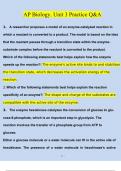Ap biology unit 3 - Study guides, Class notes & Summaries
Looking for the best study guides, study notes and summaries about Ap biology unit 3? On this page you'll find 111 study documents about Ap biology unit 3.
Page 4 out of 111 results
Sort by
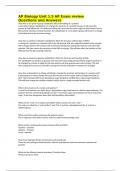
-
AP Biology Unit 1.5 AP Exam review Questions and Answers
- Exam (elaborations) • 2 pages • 2024
- Available in package deal
-
- $9.59
- + learn more
AP Biology Unit 1.5 AP Exam review Questions and Answers How does a non polar R group substitution affect the folding of a protein? A non polar R group substitution can change the structure of a protein because it will cause the protein to fold differently. This different folding will cause the Non polar region to fold inward. Due to the fact that structure controls function, the substitution of a non polar R group will result in a change in function due to the structure change How does ...

-
AP Biology Unit 1 Test Study Guide with Complete Solutions
- Exam (elaborations) • 16 pages • 2024
- Available in package deal
-
- $9.99
- + learn more
AP Biology Unit 1 Test Study Guide with Complete Solutions water - Answer️️ --polar molecule -polar colvalent bonds -oxygen end is partial negative and the hydrogens have a partially positive end -cohesive polar covalent bonds - Answer️️ --opposite ends of the molecule have opposite charges cohesion - Answer️️ --H bonding between H2O creates it (sticky) -allows for the movement of water against gravity -high surface tension -water moves up a tree by transpiration (helped b...
AP Biology. Unit 3 Practice Questions and Answers (2024 / 2025) (Verified Answers)

-
AP Biology Final Exam Review Study Guide with Complete Solutions
- Exam (elaborations) • 21 pages • 2024
- Available in package deal
-
- $9.99
- + learn more
AP Biology Final Exam Review Study Guide with Complete Solutions emergent properties - Answer️️ -new properties that emerge with each step upward in the hierarchy of life, owing to the arrangement and interactions of parts as complexity increases negative feedback - Answer️️ -a mechanism of response in which a stimulus initiates reactions that reduce the stimulus positive feedback - Answer️️ -a physiological control mechanism in which a change in a variable triggers mechanism...
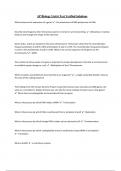
-
AP Biology Unit 6 Test Verified Solutions
- Exam (elaborations) • 7 pages • 2024
-
Available in package deal
-
- $9.99
- + learn more
AP Biology Unit 6 Test Verified Solutions What enhances the expression of a gene? ️the attachment of RNA polymerase to DNA Describe what happens when the lactose operon is turned on and transcribing. ️Allolactose or lactose binds to and changes the shape of the repressor. Genes A,B,C, and D are located on the same chromosome. Testcrosses show that the recombination frequency between A and B is 36% and between A and C is 23%. The recombination frequency between C and D is 5% and b...
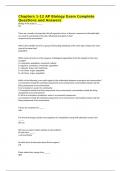
-
AP Biology Exam Bundle |Latest Update
- Package deal • 48 items • 2024
-
- $44.49
- + learn more
ULTIMATE AP Biology Exam Review Questions and Answers Graded A+ 2 Exam (elaborations) Pre-AP Biology Final Exam with complete solutions 3 Exam (elaborations) Chapters 1-12 AP Biology Exam Complete Questions and Answers 4 Exam (elaborations) AP Biology Unit 2.1 AP Exam review Questions and Answers 5 Exam (elaborations) AP Biology Unit 2 Cell Str
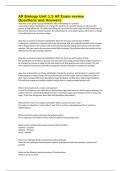
-
AP Biology Unit 1.5 AP Exam review Questions and Answers
- Exam (elaborations) • 2 pages • 2024
-
- $9.59
- + learn more
AP Biology Unit 1.5 AP Exam review Questions and Answers How does a non polar R group substitution affect the folding of a protein? A non polar R group substitution can change the structure of a protein because it will cause the protein to fold differently. This different folding will cause the Non polar region to fold inward. Due to the fact that structure controls function, the substitution of a non polar R group will result in a change in function due to the structure change How does ...

-
AP Biology - The Chemistry of Life Questions and Answers | 100% Pass
- Exam (elaborations) • 14 pages • 2024
- Available in package deal
-
- $9.99
- + learn more
AP Biology - The Chemistry of Life Questions and Answers | 100% Pass elements - Answer️️ -substances that cannot be broken down into simpler substances by chemical means CHNOPS - Answer️️ -an acronym representing the 6 key elements of life carbon - Answer️️ -key element of life; major component of ALL organic compounds, including all 4 types of macromolecules (sugars, fats, proteins, and nucleic acids); rarely found unbound to other elements hydrogen - Answer️️ -key eleme...

-
The Psychology Of Sex And Gender 1st Edition by Jennifer Katherine - Test Bank
- Exam (elaborations) • 451 pages • 2023
-
- $27.39
- + learn more
Chapter 3: The Nature and Nurture of Sex and Gender Test Bank Multiple Choice 1. As early as 1993, Biologist Ann Fausto-Sterling argued what about biological sex? A. that at least five or more biological sexes should be recognized B. that the cultural tendency to view sex as binary is largely correct C. that there are actually three biological sexes D. that the concept of biological sex is meaningless Ans: A Learning Objective: 3-3: Analyze the biological and sociocultural factors...

-
AP Biology - Unit 2 Study Guide with Complete Solutions
- Exam (elaborations) • 15 pages • 2024
- Available in package deal
-
- $9.99
- + learn more
AP Biology - Unit 2 Study Guide with Complete Solutions List the differences between a prokaryotic & a eukaryotic cell. - Answer️️ -Eukaryotic Cell: - nucleus (has more DNA) that's bound by a double membrane - endomembrane organelles in the cytosol (nuclear envelope, endoplasmic reticulum, Golgi apparatus, lysosomes, plasma membrane, various types of vesicles & vacuoles) - typically larger Prokaryotic Cell: - no nucleus, but has DNA (circular chromosome) that is concentrated in the...

How much did you already spend on Stuvia? Imagine there are plenty more of you out there paying for study notes, but this time YOU are the seller. Ka-ching! Discover all about earning on Stuvia

